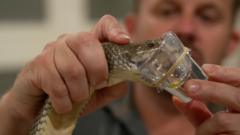Tim Friede's extraordinary blood has provided scientists hope for creating a universal antivenom which could save thousands from snakebite fatalities and disabilities.
New Breakthrough in Antivenom Development Stemming from Unique Human Experimentation

New Breakthrough in Antivenom Development Stemming from Unique Human Experimentation
A groundbreaking antivenom developed from a man’s unique journey with snake venom raises hope for universal treatment against snake bites.
A remarkable development in the field of snakebite treatment has emerged from Tim Friede, a man who has deliberately subjected himself to snake venom for nearly two decades. His blood, rich in unique antibodies, has led to the creation of an unprecedented antivenom capable of defending against various venom types. Current treatments are tailored to specific snake species, but with Friede’s contributions, researchers believe a universal antivenom may be within reach.
Over the course of 18 years, Friede has endured more than 200 snake bites and administered over 700 venom injections from some of the world’s most lethal snakes, such as cobras and mambas. His initial objective was to build immunity while handling snakes, a journey he documented online. However, after an alarming incident left him in a coma, his motivations shifted to developing better therapies for snakebite victims globally.
Antivenom typically relies on extracting antibodies from animals that have been exposed to snake venom. These treatments must match the specific snake species involved; however, this can be complicated due to variations even within a single species. In response, a team of researchers turned their attention to broadly neutralising antibodies that target generalized toxin properties. Dr. Jacob Glanville, the CEO of Centivax, took a keen interest in Friede’s case, believing he could possess the necessary antibodies.
Their collaboration, which received ethical approval to proceed with blood sampling, yielded promising results. Focusing primarily on elapids, a venomous snake family known for neurotoxins that can paralyze victims, researchers identified multiple antibodies in Friede’s blood that demonstrated the ability to protect against neurotoxic venom. Their finalized antivenom cocktail has shown efficacy in experimental trials with mice, suggesting survival rates against a considerable number of venomous snake species.
While researchers pursue further refinements and aim to address the broader classes of venom toxins, including those present in vipers, the potential for a universal antivenom is within sight. Experts in the field acknowledge the significance of Friede’s extraordinary immune response; it could offer a genuine path forward in safeguarding against the thousands of fatalities caused by snakebites annually.
Despite the challenges ahead, including necessary clinical testing before human implementation, Friede expresses pride in his contributions. His work not only holds promise for improved snakebite therapies but also underlines the lengths some individuals are willing to go for the betterment of humanity.






